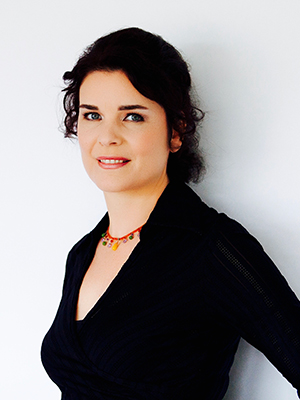
Jeannine Walston Photo courtesy of Jeannine Walston
In 1998, I was 24 years old and working in the Washington, D.C., office of a member of Congress. I had plans to attend law school. But a brain tumor diagnosis changed all that. Suddenly I was thrown into an undesired new world.
My first task was to decide on the best treatment for me. After doing some research, I decided on the option, unusual at the time, of having surgeons operate on my brain while I was awake. The tumor was in the left temporal lobe, which governs speech, memory and hearing. Through brain mapping done before and during surgery and with my real-time input, the surgeons knew what to remove while protecting my cognitive function. The pathology report revealed that I had a grade II oligoastrocytoma, and thankfully my next MRI showed the entire tumor had been removed. I felt tremendous gratitude, but I also experienced physical and psychological pain after surgery as I transitioned into a chaotic post-cancer landscape.
Necessity can be a powerful teacher, and I began to perceive challenges as opportunities and translate adversity into action. I asked many questions of neurosurgeons, neuro-oncologists, pathologists, other health care practitioners and powerful teachers in my quest for healing. I investigated complementary and alternative therapies, such as acupuncture, herbal and dietary supplements, and spiritual learning. I also underwent psychotherapy and participated in cancer support groups.
Yet in 2004, I was informed that I had a brain tumor recurrence. The diagnosis shook me to the core, but I used the experience as a wake-up call. I learned how to conduct more research, improve doctor-patient communication, collect reports about MRIs and appointments, investigate innovative brain tumor treatments and search for better approaches to self-care. After consulting with my neuro-oncologist and carefully considering my options, I chose to have the tumor monitored through MRIs rather than undergo surgery or other traditional treatments.
For the next seven and a half years, I used many strategies to promote my health and healing. I centered on lifestyle and environmental factors, ultimately developing a kind of integrative cancer care for the whole person that addresses the body, the mind-body connection, spiritual vitality, social support and a cleaner environment. Studies indicate that integrative care improves quality of life, extends cancer survival and reduces cancer risk. I became motivated; I felt inspired.
Working with an integrative cancer care team, I started eating healthier organic foods and attended raw foods retreats to help cleanse my body. I consumed a rainbow of vegetables, and I reduced sugar, dairy, meat and gluten in my diet. Exercise and spending time in nature helped to support my body and strengthen the mind-body connection. Meditation and music played important roles. Spirituality has helped me heal and improve my perspectives on life and meaning. Family, friends and many others supported and cared for me through the highs and lows. I worked to reduce environmental chemicals and toxins in my life, including in my kitchen, bathroom and outside my home.
In 2011, an MRI revealed that the tumor had grown to an extent that I needed a second awake brain surgery. Due to further brain tumor growth as the cancer progressed from stage II to III, I underwent a third awake brain surgery in 2013 at the University of California, Los Angeles (UCLA) Brain Tumor Center. The following year, I had radiation therapy, took the oral chemotherapy drug Temodar (temozolomide), and participated in a phase II clinical trial of DCVax-L, a vaccine developed at UCLA that can help the body’s immune system recognize and kill cancer cells. Other studies done at UCLA have shown that DCVax-L improves survival for some glioblastoma multiforme stage IV brain cancer patients.
Today, I am doing quite well. I continue to have MRIs and see my neuro-oncologist on a regular basis. My journey continues and has given my life profound meaning. Using my own hard-earned knowledge, I’ve become a cancer coach, writer, consultant and speaker. My goal is to educate and advocate for cancer patients and help to improve the cancer care continuum for them. Many advances in care and treatment are occurring, and many more are on the way.
Cancer Today magazine is free to cancer patients, survivors and caregivers who live in the U.S. Subscribe here to receive four issues per year.




